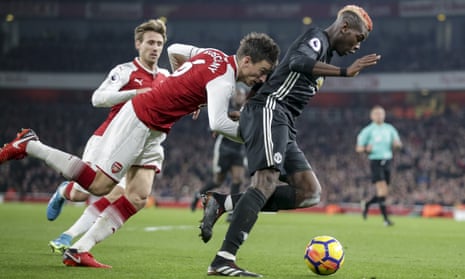A French midfielder with massive presence sent off in an intense match between Manchester United and Arsenal reflected on his emotions in the dressing room, mind whirring while the latter stages of the game was played without him. “It’s tough, especially in a big moment like that,” he said. “You feel like you let the team down. There are so many emotions going through your mind, and everything is negative – I was so mad about the red card.” As it happens, those words belong to Patrick Vieira, who experienced the frustration of being dismissed – unfairly in his view – in a simmering encounter at Old Trafford in 2003.
Like Vieira on that heated day, the result ended up favourable enough for Paul Pogba this weekend to ensure the immediate vexation was not punished, as his team-mates maintained a meaningful result without him. But the aftermath brings added complications. For club and player, suspension for this weekend’s showdown against Manchester City, plus a couple more games on top, is a bitter pill.
Pogba’s influence during United’s win at Arsenal was immense. His charisma, when he got on the ball with some space to influence opening up in front of his eyes, was a major factor. David de Gea’s goalkeeping masterclass and Jesse Lingard’s cleverly timed runs to finish ruthlessly merited glowing praise. But of the game’s many pivotal moments, the killer blow came when United were being swamped by opponents cranking up their attack in search of an equaliser.
Counter time. Pogba marauded down the right channel and when he picked up the ball he beat Laurent Koscielny with a blend of muscle and delicate footwork before clipping over a perfect invitation of a cross that Lingard accepted with delight. There is no obvious replacement for Pogba, especially for a team under pressure in a high-profile game, a situation designed for players with big-match personality to make a difference. It is hard to imagine he will not be missed whatever plan José Mourinho comes up with to try to halt the runaway neighbours.
Many details created this humdinger of a match. There was enough going on that it felt like several games within one 90 minutes. Weighty analysis is justified about everything from Arsenal’s sloppy defending, De Gea’s extraordinary double save, the weird statistical contrast between the expected goals and the real scoreline, the way Arsène Wenger’s team created so many chances in a big game (and indeed the efficacy of United’s defence in allowing themselves to be so open even if they got away with it), Alexandre Lacazette’s improvement now that a rapport with his team-mates has bedded in, a couple of penalty decisions, and Pogba’s dismissal.
One of the compliments Mourinho paid his team afterwards was about their adaptability. They began with the snappy energy to surprise anyone who suspected a bus parking operation had been ordered, spearing Arsenal slips with an impressively sharp edge. Then they had to hang on. Finally, the way they reorganised when Pogba was sent off after the full weight of his stride landed on Héctor Bellerín’s legs was an example of how to force an opponent to drop their tempo and lose their rhythm.
Mourinho was not minded to get into whether a thrilling away performance has any impact on the title scenario. Wenger confronted the same question, phrased in reference to Mauricio Pochettino’s admission that Tottenham are no longer considering themselves involved in any kind of race for top spot.
“I am not Pochettino, I am Arsène Wenger. I am here to fight as long as I can, as long as mathematically it’s possible you have to fight, you cannot give any other message out,” he said. “I believe the game [against Manchester United] has to make us angry and even more determined. If I am a player, and I think with what we produced, we have a huge potential. And we lose the game? We cannot accept that. That’s what you want.”
Wenger was hurting and angry, reeling about the lack of efficiency that affected them at both ends of the pitch, and said that his players felt the same way. “I feel sorry for the players, that’s why I’m angry … When the performance is of that quality we have to be efficient. We are in this job to be efficient, you know. So I blame myself first. We have lost games here against Man United where we didn’t deserve anything. But what makes you angry is that you produce that performance and in the end you have nothing to show for it. De Gea is an outstanding goalkeeper, I don’t want to take anything away. But we had situations, despite De Gea, we should have scored.”
On that note, even in their victory United will have to ponder their own plan considering free-scoring Manchester City have the form to be more ruthless in front of goal. They might need something extra than leaning on a miracle from De Gea to underpin them again.

Comments (…)
Sign in or create your Guardian account to join the discussion